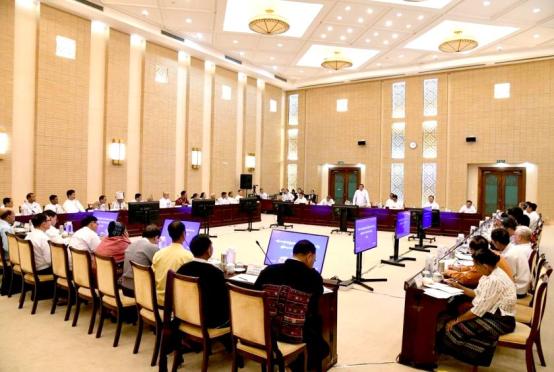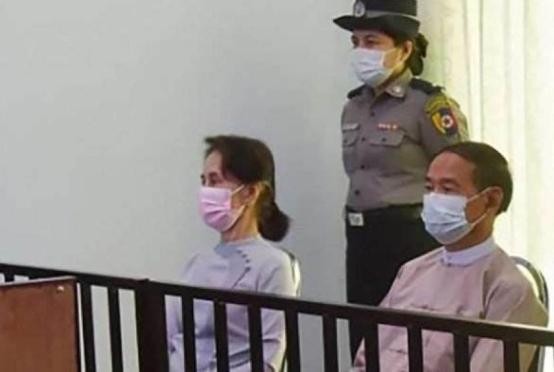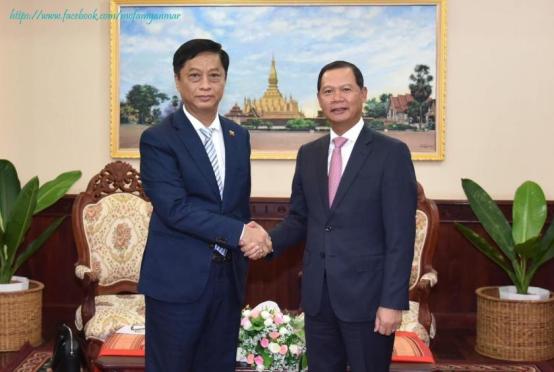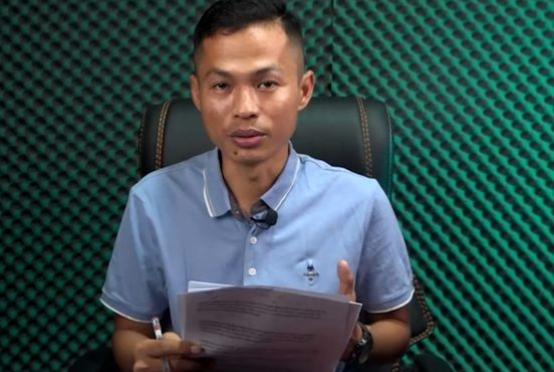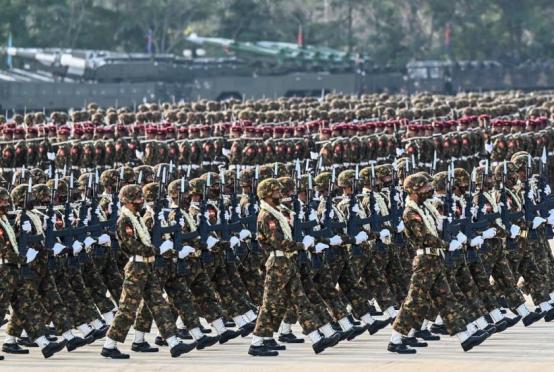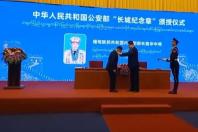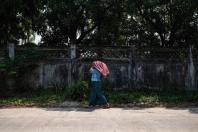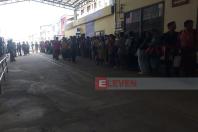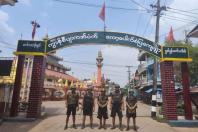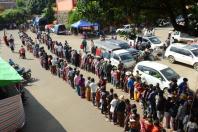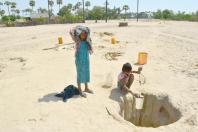The 2020 General Election is likely to be held in coming November, said U Myint Naing, a member of the Union Election Commission (UEC), at a press conference on 4 June.
“Like the previous election, the UEC has planned to hold the election in coming November. The UEC announced the election date four months before the November 7 election. The UEC will announce the election date appropriate for the public and for the political parties to conduct canvassing campaigns,” U Myint Naing added.
This article will highlight the facts that how many political parties will run for the seats in the 2020 General Election, how many political parties has increased between 2016 and 2020, the annulment of some political parties by the UEC and the emergence of some political parties.
How many?
According to the UEC’s figures, there are 97 registered political parties.
A total of 79 political parties will conduct canvassing campaigns for 2020 General Election nationwide while 18 political parties will conduct the similar campaigns only in a region or a state, according to a statement by the UEC on 25 May.
The UEC allowed 128 parties to be registered as political parties, abolished 31 parties and temporarily suspended three political parties, the statement says.
The UEC set the deadline for the applications of the parties’ name, flag and logo by October, 2019 and the establishment of political parties in December, 2019. Currently, there is no scrutiny of the applications for the establishment of and registration as the political parties.
Section 5 (f) of the Political Party Registration Law says “Admission that it will organize at least 1000 party members within 90 days from the day of permission granted for registration as a political party if it is a party that will organize throughout the entire Union or admission that it will organize at least 500 party members within 90 days from the day of permission granted for registration as a political party if it is a party that will organize only within a Region or a State.”
How many parties are allowed by the UEC?
In the time of the NLD-led government between 2016 and 2020, the UEC allowed additional 28 parties to be registered as political parties—one in 2016, nine in 2017, 14 in 2019 and four in 2020.
Till 2015, there were 100 political parties. Now the total number of political parties including 28 new parties allowed by the current UEC, has reached 128.
Which political parties get abolished?
Of 31 political parties abolished by the UEC, the number of parties abolished in the reign of the current UEC has reached 22—two in 2017, four in 2018, 11 in 2019 and five in 2020.
Most of the abolished parties are ethnic parties which went ahead with merger of parties. According to Section 25 of the Political Parties Registration Law, the parties with the former names were abolished.
One party was abolished according to Section 12 (a) of the Political Parties Registration Law as it had no rights to compete in three constituencies. One party was abolished according to Section 24 (e) of the law as it failed to abide by the law during the temporary suspension period. The UEC allowed the abolishing of four parties on their own, according to the UEC’s figures.
Significant parties
Before the 2020 General Election, the new political parties have emerged. Some ethnic parties did the merger.
Of the new parties, the People’s Party led by U Ko Ko Gyi who was a leader of “8888 Uprising’ can draw the attraction of the people.
Since 2017, some 88 generation students including U Ko Ko Gyi have tried to establish the party under the name of “8888 Party”. But it faced remonstrations against the name of “8888” which is one of prominent uprisings in the history. Later, the party leaders changed the party’s name into “8888 People’s Party”. Finally, the party decided to register it as “the People’s Party. The UEC allowed the establishment of and registration as the People’s Party in mid-2018. The People’s Party, composed of some 88 generation students is preparing to compete in the upcoming election.
U Ye Naing Aung, General Secretary of the party said: “The policy of the People’s Party is the emergence of a National Unity Government Beyond 2020 Election.”
Former top military officers from the military government are also preparing to compete in the 2020 General Election. Among them, the Union Betterment Party (UBP) led by former general and former speaker of Lower House Parliament Thura U Shwe Mann is the most prominent one.
The recruitment of party members nationwide and the opening of township party branches are much faster than other parties though the term of the party is not so long.
The UBP’s leader Thura U Shwe Mann said on 18 June: “It is very difficult to form the government by a single party beyond 2020. There will be the formation of a coalition government. In addition, we should look at the situation of ethnic parties. The UBP aims to build a federal democratic Union. It is assumed that ethnics and all people will be satisfied with the party’s goal.”
“As I mentioned earlier, the party will achieve such success thanks to the trust of the people and ethics,” he added.
I hope the UBP will be in a position to lead the formation of the government.
Other retired military officers established the Democratic Party of National Politics in order to enter the executive body via the parliamentary channel.
The party is led by former President’s Office Minister and former military officer U Soe Maung and former Union Auditor-General U Lun Maung. The party’s leaders are former Generals and Major Generals. As a civilian leader, former Lower House MP U Soe Win serves as Vice-Chair-2.
The party said it will practice nationalism based on the entire ethnics. It will join hands with any parties, organizations and individuals, which conduct the constructive works pertaining to nationalism. It will oppose any acts which may undermine nationalism.
Although parties from six states joined hands to form a new political party, Rakhine parties, which joined hands, split.
Arakan League for Democracy Party split from Arakan National Party in 2017 and re-founded the Arakan League for Democracy Party. They joined hands to compete in the 2015 general election.
Moreover, the famous Rakhine politician Dr Aye Maung quit from the Arakan National Party and founded the Arakan Front Party.
Dr Aye Maung is serving a long prison sentence for high treason and conducting public mischief and his son, U Tin Maung Win, is a member of the party.
Rakhine people are focused on the Arakan Front Party as although the Arakan National Party was being popular to represent in No.2 Yathedaung Constituency in 2018 by-election, U Tin Maung Win, who is an independent candidate, won the landslide victory over the Arakan National Party at the election.
Only a small number of ethnic parties except for Rakhine and Shan parties represented in their respective state parliaments after the 2015 election.
Political parties from Kachin, Kayah, Kayin, Chin, Mon and Wa are implemented to join hand in this year and now they have joined hand.
Three Kachin parties joined hands to form the Kachin State People Party and two Kayah parties joined hands to form Kayah State Democratic Party. Three Kayin parties merged into to establish Karen National Democratic Party and three Chin parties merged into to establish Chin National League for Democracy. Two Mon parties merged for the Mon Unity Party and three Wa parties merged for Wa National Party.
Some leaders of political parties, which merged, remarked they are confident of winning at the election more than before after the parties are merged for the 2020 election.
Some MPs represented the National League for Democracy in the 2015 general election quit from the party for various reasons and founded new parties. U Sein Win, Pyithu Hluttaw MP of Maubin Constituency founded National United Democratic Party and Dr Thet Thet Khaing, Pyithu Hluttaw MP of Dagon Constituency, founded People’s Pioneer Party.
They established new parties after they had been removed from the party’s duties.
U Sein Win is an agriculture degree holder and he is famous for issues related with farmers in his term.
The People’s Pioneer Party, which declares the party’s policies and programmes will be a priority instead of a system which relies only on a power person or centralization, will catch the eyes of voters in the 2020 general election.
Some MPs, elected in the 1990 general election, founded the Union National Development Party and applied the party registration in April 2019. Their registration was successful in December.
The patrons and top leaders of the party are MPs elected in the 1990 general election as the party is organized with the former MPs, some political forces and political activists.
The eight patrons including U Naing Naing, Khun Mar Ko Ban and Dr Min Min Soe are elected and Khun Htun Oo, MP of Hsipaw Constituency in 1990 election and Chair of Shan Nationalities League for Democracy, is elected as the party leader, said David Hla Myint, Chair of the Union National Development Party.
Although the Union Election Commission (UEC) confirmed the election will be held in November, the UEC didn’t announce the exact date of the election, the election campaign period and the timetable to submit the list of candidates.
A total of 30 political parties including Union Solidarity and Development Party (USDP) sent a letter to the UEC dated June 16 to meet political parties as quickly as possible in concern with the holding of the 2020 general election.
“The UEC said the election will be fair and independent and we think it will not be denied if we ask to meet and discuss about the election,” said U Thein Tun Oo, spokesperson of the USDP.
The letter stated four sections and included 12 facts in the third section to discuss with the UEC about the election matter.
The UEC needs to meet the political parties to explain about the vote count, procedures of external and early voting, the submitting of candidate lists, ethics of candidates, the number of polling stations and voting system.
It also said the UEC needs to explain about the minimum number of voters’ turnout to hold a successful election, the use of the name of the township elders to increase the party image and to avoid the use of the image and possessions of the state leaders.
The 30 political parties are National Unity Party, National Development Party, Democratic Party (Myanmar), National Democratic Force Party, Wa National Party, Chin National League for Democracy Party and Shan Nationalities Democratic Party in addition to some political parties based in mainland and states.
At the present, a total of 97 parties are registered at the UEC and the parties are choosing their candidates to compete in the 2020 general election.
The voters will see how the political parties listed to compete in the 2020 general election give pledges to them at the upcoming election.

